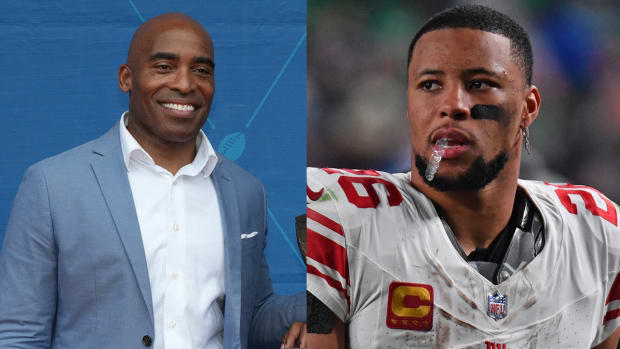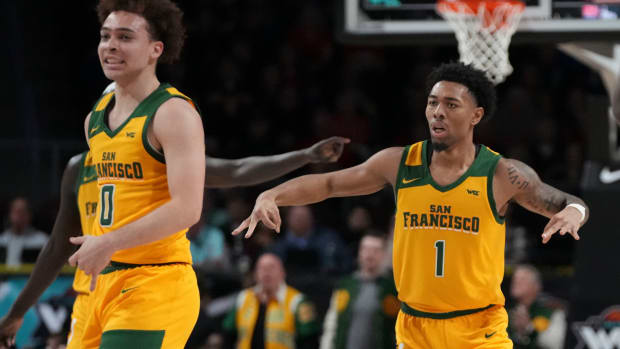Mick Foley discusses the importance of Cactus Jack and his emotional connection with fans
In this Sports Illustrated exclusive, WWE Hall of Famer and New York Times best-selling author Mick Foley penned an essay revealing the meaning behind his Cactus Jack character.
There is a moment from a Jan. 2000 episode of SmackDown that has been inducing goosebumps with great regularity for the past 17 years. With the bar for physical impressiveness being pushed forward with such regularity in sports-entertainment, it would stand to reason that a moment in time that creates such great emotion would be the product of some amazing feat of strength, agility or courage. But this isn’t quite Snuka coming off the top of the cage in 1983, Hogan slamming Andre at the Pontiac Silverdome in 1987, or even my own flight from the top of the “Hell in a Cell” in 1998. No, this one is a little different. It’s just me, in my Mankind persona, pulling off my leather mask, unbuttoning my long sleeve work shirt to reveal a t-shirt underneath–while my nemesis, Triple H reacts as if he’s seen a real life ghost.
It seems so silly on the surface–like there’s no way it should have worked in Jan. 2000, let alone still be inducing chills all these years later. For the uninitiated, or those who just need a quick refresher course, there was some substance to the reveal of the t-shirt. For it was symbolic of a changing of the guard - from the wild, but sometimes innocent, almost childlike Mankind, to the legendary Cactus Jack. After all these years, I look back on that transformative moment, and believe it worked for three reasons: WWE had done a great job of making the Cactus Jack character almost mythical not only to the original Cactus fans, but also (and probably more so) to those who’d only seen his occasional returns in WWE. It also worked because the look in Triple H’s eyes makes the fan absolutely believe that Triple H believes in the magnitude of the moment. For if Triple H had picked up a mic, given a dismissive laugh and said, “you’re the same guy in a new shirt”, Cactus Jack could have taken up residence in a simile likening his relevance to a certain part of Kelsey’s anatomy. Yes, Cactus Jack, figuratively speaking, in terms of drawing potential, would have been dead. Most importantly, it worked because something about that character, blended with a real life appreciation for what I had endured while portraying it, endeared Cactus Jack to a certain section of the pro wrestling fan base; a mutual love affair (strictly platonic) three decades in the making.
• See where Mick Foley lands on our list of 101 all-time top wrestlers
It wasn’t supposed to be that way. Cactus Jack was supposed to be a generic, boring name for a 6-foot-4, 220 pound Long Islander big on heart, but lacking in athletic ability and the thick slabs of muscle which had become almost mandatory in the mat game by the mid-eighties. So when I was asked my name 31 Junes ago at the Clarksburg, West Virginia armory before the first match of my career, the name “Cactus Jack” just kind of came out. I only intended to be Cactus Jack long enough to learn the ropes and develop enough confidence to become the man I really thought I was destined to become–Dude Love, eye candy for the ladies, the object of so many women’s affections, that long ago he’d refused to count them all. Mother Nature had other plans however, and 11 years later, I was still Cactus Jack when the WWE finally came calling with the opportunity to wrestle The Undertaker.
I only found out a few years ago that my hiring was a gradual concession by Mr. McMahon to the constant pressure applied by head of talent relations Jim Ross. It was, however, an acquiescence with a caveat; “OK, I’ll hire him... but I’m covering up his face!”
Mr. McMahon, you see, was not a Cactus Jack fan. But, following a notable first year in a leather mask as Mankind, Mr. McMahon had a change of heart, and not only gave Cactus Jack the occasional opportunity in WWE, but built up the Cactus character to be my toughest and wildest incarnation of all. It was if he was admitting to me, and whoever out there was watching, that he just might have missed the boat on that Cactus Jack guy after all!
In so doing–in allowing a guy who (in his opinion) didn’t look like a star, Mr. McMahon just may have opened up the possibility that other unlikely prospects might find a home, and stardom inside the WWE. Maybe, just maybe, the lesson learned from the Cactus Jack experiment helped open the door for future WWE Superstars such as Daniel Bryan, CM Punk, and Kevin Owens–all of whom flourished in what would have been seen as a very unlikely environment a generation earlier.
So, yes, WWE deserves much of the credit for how they chose to portray a colorful journeyman like Cactus Jack. But there was something real there too–something fans could truly believe in. Even as the world learned new truths about me–I was from New York not New Mexico, the only thing truly deranged about me was my fashion sense–the legitimacy of Cactus Jack was only heightened, never questioned. I think it’s because there was an understanding that even given the entertainment aspect of pro wrestling, the struggle to the top had been hard-earned and well deserved, and that the legendary tales of suffering had all turned out to be very true.
In Jan. 1995, on the last day of a grueling tour of Japan for the fledgling “blood and guts” IWA promotion, I watched with great concern as the ring ropes came down, and barbed wire (real wire, darn real) went up–in preparation for my main event match with the great Terry Funk, 20 years my senior and a veritable icon in Japan. The crowd was small and the gym was cold–with maybe 150 well-dressed fans filling just the first few rows of the gymnasium. Terry Funk was on the other side of the gym. I would not so much see him, let alone talk to him until the match began. Terry never liked to talk too much before matches anyway. He preferred to just let things happen. Act and react. So although I had no idea what might happen once that bell rang, I had a pretty good guess that part of what the future held for me was the likelihood that I would return to the dressing room in worse condition that I’d left it. Possibly much worse. Seeing the state of mind I was in, I was approached by respected veteran Tracy Smothers.
“Cactus, there’s not many people out there tonight,” said Smothers. “Promise me you won’t do anything crazy out there.”
I looked at Smothers as if those most reasonable of words constituted the most absurd request of all time.
“You know I can’t do that”, I said, and swung open the door for my date with destiny.
Of all the things I’ve ever said during the course of my career, those are the words I’m proudest of!
“You know I can’t do that.”
It was just a real answer to a real request... albeit the most absurd request of all time. It wasn’t a wrestling promo. It wasn’t even supposed to be cool, let alone bad ass. But yet, 22 years after the fact, I think those are the coolest, most bad ass words I’ve ever spoken. And therein, I believe, lays the emotional connection to Cactus Jack!
Follow SI Wrestling on Facebook
Follow
Even if fans never heard those words, they know Cactus Jack would say words like those–without prompting, without scripting. Because even if the realization was only subconscious, they knew in their heart (if not their head) that being Cactus Jack was above all else, a commitment to never giving less than your best.
It’s a commitment that resonates with so many, with its battle cry, “you know I can’t do that” not being nearly as outlandish or unobtainable as it might seem. It’s the same spirit that allows the awkward schoolboy to take a try at Little League, knowing that a strikeout with the game on the line has seemed like a fate worse than death for so many over the years. It’s that same spirit that motivates a young child into talking his mother into letting him play goalie in ice hockey... ice hockey, where physical injury is not so much a possibility, but a virtual guarantee. It’s the same spirit that pushes a middle school teen into cross-country, yes cross-country, where the tranquility of a beautiful fall afternoon is willingly traded for the thumping of one’s own heart, the aching of the rib cage, the lactic acid build-up in the quads–with the understanding that all of this suffering will be done in something close to anonymity; an acknowledgment that almost all of the sacrifice will go unacknowledged!
With those words, “you know I can’t do that”, Cactus Jack gives voice not only to the athletes who struggle in obscurity, but to performers across the entertainment spectrum - from the dancer working for gas money in local theater to the comic dying a slow death in front of half a dozen drunks on the Friday late night show. Common logic might tell them to stop. But you know they can’t do that. I did in fact, return to that dressing room in Japan that night in January, 1995 in worse shape than I entered it. Much worse. But I also know what it’s like to die a slow death at a comedy club in front of a half dozen drunks at the Friday late show. That pain hurts worse. Much worse.
Cactus Jack connects with the part of us that tells us to keep going no matter how bad things look, or how ugly they might get. Cactus Jack speaks to the part of us that believes that asking us to give anything less than our best is not only an insult to ourselves and our audience, but a request that is totally and utterly absurd. Bang bang!
Pro Wrestling Tees has brought back Mick Foley’s “Wanted” Cactus Jack t-shirts for 52 hours. Each shirt is sent with a signed certificate of authenticity from Foley, who shares the moment in a cold, damp locker room in Japan when Cactus Jack forever captured a moment of his heart. Mick Foley can be reached on Facebook and Twitter.






